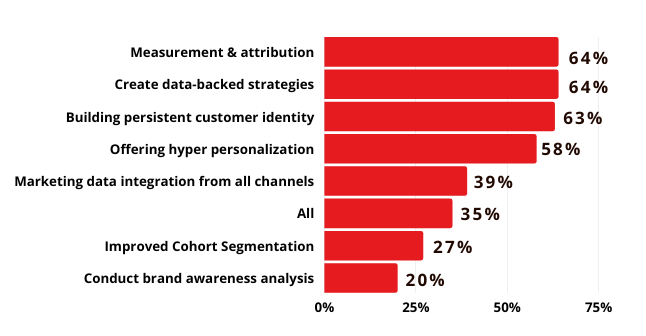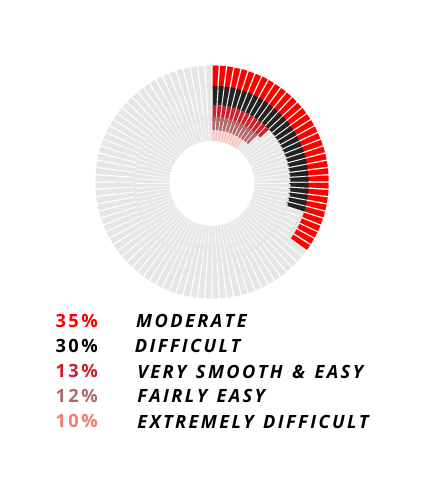Cloud analytics is an emerging field that has been gaining traction in recent years due to the rise of big data and cloud computing. Cloud analytics, i.e. the application of Data Analytics on your servers and data in the Cloud. A third party provides the Cloud Analytics platform to organisations that cannot afford a storage facility on their premises. These are usually either public or private. In the past few years, marketing is seeing an increased focus on cloud analytics. But what is cloud analytics?
In this article, you will learn more about cloud analytics and why is it trending in marketing.
In this article:
1. What Is Cloud Analytics?
2. Benefits Of Cloud Analytics
3. Why Do Businesses Use Cloud Analytics?
4. Shifting Focus From Antiquated Systems
5. Conclusion
What Is Cloud Analytics?
Cloud analytics refers to using analytic algorithms in a private or public cloud to analyse data and then deliver results. The powerful embedded analytics software makes extracting and analysing insights from cloud-based data easy. Like on-premises analytics, cloud analytics is applied to extensive data collections to identify patterns, predict the future and produce business insights. As the volume and value of data continue to climb, data analytics becomes an increasingly valuable tool.
The marketing field is rapidly being shaped by cloud analytics, and the projected growth rate for the market is at a CAGR of 20.9% between 2021 and 2028 [1]. According to a recent Marketing In Asia (M.I.A.) research, 91% of the respondents agreed to use analytics to gather insights on customer data to build an intelligent system.

Image source: MIA research report Shifting Marketing Priorities
Benefits Of Cloud Analytics
- Security: Data analytics in the cloud is more trusted and secure, making it a natural choice for enterprise-wide adoption. With most cloud analytics, data is frequently backed up to servers in multiple locations. This means that if one of the servers goes offline, any lost data is stored on the other. This makes it a lot more secure than local monitoring. All data is confidential and secure. You only have access to what you need; audit logs will show which users have accessed your content. Even if there is a data breach, it won’t take long for security teams to identify the issue.
- Flexibility: Cloud services offer numerous benefits, including the ability to scale up or down on-demand without buying servers or other resources. They make it easy for businesses of any size to support their customers’ needs without interruption. The infinite supply of access and storage offers the ability to scale. Cloud analytics can add agility to your business model with the flexibility provided with user management, cost relief, security and performance.
- Approach from anywhere: Employees in finance, IT, marketing & sales need access to their respective departments’ data and analysis tools. As a result, they may have to spend time training themselves on multiple systems/applications, or they could be wasting time looking for data from different systems. Cloud analytics pull data from your company’s ERP system and displays it to all employees. This way, no matter where they may be working, every employee has the same information and can easily access various analytics tools.
Also read: 5 Reasons Why Cloud Computing Matters For Business Growth
- Collaboration: The cloud is great for collaboration. With it, you can share data over platforms that are easier to access than email attachments, network file sharing and conflicting copies of reports. Cloud analytics allows you to store & analyse your data in one central place accessible by everyone. This means you can easily track any part of your company’s success and share workloads.
- Reliability: What’s data analysis without a reliable source? On-premise systems are helping companies that review qualitative data to track progress but to ensure the validity of your results; you need an up-to-date performance over the cloud. On-premise systems are limiting, especially when it comes to IT resources. Working over the cloud allows access to applications and updates that can be directly sent to your computer.
- Strategic: If you are one of the few companies with critical applications with no upfront costs and provisioning time because they can automate themselves, you’re in good shape. Cloud-based analytics allows you to focus on the needs of your business and spend less time doing other tasks such as checking costs, managing governance, and consuming new application modules. With this flexibility in mind, you have the opportunity to adopt a cloud-based analytics platform where you can find the right solution for your application or ERP system.
- Faster: Cloud computing servers are faster, more powerful and cheaper than older on-premises solutions. Further, employees can process data from any place with a smart device rather than being limited to one location.
Why Do Businesses Use Cloud Analytics?
There are many different ways you can use cloud analytics for your business. Some people only use it for reporting, whereas others might make predictions about future trends or uncover undisclosed insights from existing data. In most cases, the ultimate goal of cloud analytics is to improve profitability. Still, you may need targeted analytics for your particular purposes, such as boosting international sales or analysing the shape of your organisation.
According to M.I.A.’s research, in the marketing department, cloud analytics is primarily used for measurement & attribution & to create data-backed strategies (64% each). The study also showed that cloud analytics also catered to building a persistent customer profile (64%) and offering hyper-personalisation (58%).

Image source: MIA research report Shifting Marketing Priorities
Integration of marketing data from all channels is a significant challenge faced by the marketing team. Therefore, 39% of our respondents said cloud analytics simplified the data integration task, and 27% said it helped improve cohort segmentation. 20% also agreed to use it for conducting brand awareness analysing. Moreover, 35% of the respondents also said that they used cloud analytics for all the above-mentioned marketing activities
Shifting Focus From Antiquated Systems
More than ten years ago, the first corporations started using external cloud platforms to get ahead in business. Today we know the extent of the impact external cloud platforms can have on the profitability of a business. Cloud adoption is significant and growing. Companies that do so enjoy faster innovation, more effortless scalability, and lower risk technology.
As for what constitutes a successful cloud implementation, there are few guidelines to measure your progress and even less guidance on how to do it. It’s important not to define the cloud opportunity too narrowly. Strategies that focus on just one area of the market, like application hosting or data platforms, are doomed to fail because no thought is put into the holistic operation of the organisation in the cloud.
Reaping the benefits of a cloud platform requires that you first conduct thorough research of your IT infrastructure and business needs. Next, you design your solution according to these findings, and finally, implement an often-times complex and multi-layered software system that:
- Focuses investments on domains where the cloud can enable increased revenues, improve margins and allow companies to make the most of the benefits of a cloud-based IT strategy.
- Chooses a technology and sourcing model that suits your business strategy and risk constraints.
- Develops and implements an operating model that is oriented around the cloud
Recommended for you: The Complete Guide To Interactive Marketing
Most businesses rely on their existing application portfolio, and moving to the cloud is difficult. Companies with better-established and more financially-stable entities already invest significantly in their legacy systems. They have the knowledge and skills to use these applications developed over the years or even decades.
Our data indicates that 40% of the respondents found this switch from antiquated to a modern system quite challenging. 35% said the change was ok for them. Only 25% found it easy.

Image source: MIA research report Shifting Marketing Priorities
Conclusion
Cloud analytics is the way of the future. Its massive success is evident in the success of giants like Netflix and Starbucks, one of the first users of this technology. However, CIOs and other IT leaders must work hard to keep up with the rapid technological changes while managing their legacy systems. The cloud, for instance, has various benefits worth considering and, as per the research, is now a must to have.
Download the report to know more about such trends gaining popularity in marketing.
Endnotes
- https://www.fortunebusinessinsights.com/cloud-analytics-market-102248

















